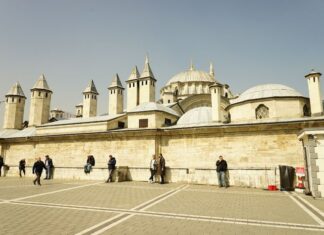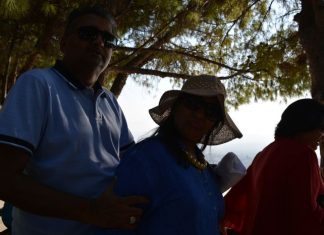Neither Cosmas nor his contemporaries would have spoken of the Roman empire as a free-trade zone, or praised the blessings of a single currency usable across many lands and ports, like today’s dollar or euro, but that was part of what the Roman empire had accomplished. Ancient currency in particular was always at risk of degradation, as cheaper and cheaper metals were used and people lost faith in the value of coins in circulation, but 200 years before Cosmas’s time, the emperor Constantine had stabilized the currency to create this world, and a few years before Cosmas sailed, the emperor Anastasius I had reimposed discipline and so created fresh prosperity again. What we now call infrastructure benefited from Roman rule as well, as roads and bridges were maintained, harbors were kept up, and security in and away from cities was generally excellent.
Greeks Jews and Syrians
Merchantry was in the main for Greeks, Jews, and Syrians; thus the economic benefits were primarily felt in the eastern Mediterranean. How the business world looked from farther east is harder to say, but we know about an anonymous Persian adventurer who landed on the island of Jotaba, at the mouth of the Gulf of Aqaba. For a few years in the late fifth century, he managed to expel the Roman customs officers and take over the regulation of trade himself, with grudging support from Constantinople. An empire can make life difficult for entrepreneurs, but it cannot live without them When Sopatros the Roman.
Then, as now, merchant life required sober judgment, decisive bargaining, and a fair amount of luck. We know enough of Cosmas’s career to see that he had all three. During more than a quarter century he sailed three challenging seas. His home waters were the Mediterranean, north and west from Alexandria, and the Red Sea, via the Nile and ancient canals, reaching down the Sinai to the opening of the Indian Ocean, beyond the straits of Bab el Mandeb. He seems also to have navigated the Persian Gulf, from the mouths of the Tigris and Euphrates down to the Strait of Hormuz.
Institutions of port management
By the time Cosmas entered the trade, these reaches of salt water all had a long history of commerce, supported by robust institutions of port management, banking, customs duties, and even credit. Alexandria had been doing business from its dazzling seafront for 8OO years, and the Phoenicians had made the Mediterranean their own long before. There are signs that sailors made it all the way from Mesopotamia to India, beginning as early as the reign of Sargon of Akkad, the great lord of the Sumerians in the third millennium BCE, a figure who lived even farther in Cosmas’s past than Cosmas does in ours. Greek and Roman civilization remained mostly trapped inside the Mediterranean, where you could sail from anywhere to anywhere without leaving sight of land, and where you huddled ashore for the winter months.








